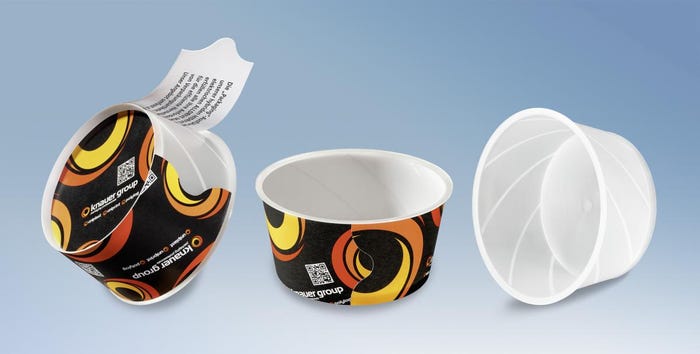Müller, the Swiss specialists for injection molding and IML automation, worked with Uniplast, a provider of PP packaging for dairy products, on the product development of the 'SKET cup.' Müller cooperated closely with the engineering department of the Knauer Group in Dettingen, the German region of Swabia. In the Engineering Center of the Knauer Group, the SKET was implemented on a Müller Multiflex Pilot Cell. The SKET application will be demonstrated at Fakuma 2014, where Müller will be at the Arburg stand (booth 3101, pavilion A3).
September 17, 2014
Müller, the Swiss specialists for injection molding and IML automation, worked with Uniplast, a provider of PP packaging for dairy products, on the product development of the 'SKET cup.' Müller cooperated closely with the engineering department of the Knauer Group in Dettingen, the German region of Swabia. In the Engineering Center of the Knauer Group, the SKET was implemented on a Müller Multiflex Pilot Cell. The SKET application will be demonstrated at Fakuma 2014, where Müller will be at the Arburg stand (booth 3101, pavilion A3).
The company claims that the recently developed SKET cup sets a "new" high standard regarding the manufacture of PP packaging using injection molding. Up to 50% of PP material can reportedly be saved versus a conventional cup. These savings are achieved due to the thin wall thickness of the cup, only 0.22 mm thick. Spiral grooves in the walls of the cup assist in flow and ensure that the plastic material reaches the upper sealing rim (0.7 mm thick) fast enough, filling out the cup completely, before the flow front freezes off. In addition, due to the angle of the incline of the spiral grooves in the wall of the cup, the material flows uniformly into the very thin cavity wall, completely filling it.
 Depending on the wall thickness of the cup, cardboard labels of various thicknesses are placed on the side wall and at the bottom to ensure the cup's stability. The cardboard labels can also be removed, which helps with recycling the packaging.
Depending on the wall thickness of the cup, cardboard labels of various thicknesses are placed on the side wall and at the bottom to ensure the cup's stability. The cardboard labels can also be removed, which helps with recycling the packaging.
"Such revolutionary successes can only be achieved with elaborate and ingenious product development, along with an intensive pilot phase," said Guido Pöhls, co-owner and managing director of Uniplast. "Müller provides systematic support within the complete supply chain regarding the creation of new injection molding products, providing full-service from under one roof."
How product development took place
Very early in the process, suggestions on the part design are shared along with preliminary drawings and 3D animation of the part concept. Subsequently, at the 3D-CAD modeling stage, all of the factors and intricacies involved with a successful injection molded IML product were taken into account by the staff involved with the project. The next step consists of a moldflow analysis. This serves as the basis for calculation of the possible reduction in weight, the major cost factor for mass production. The moldflow analysis insures flow distribution for homogeneous filling of the parts, enhancing the mold's service life substantially.
Further calculations and simulations help reduce the required clamping force, maximize top load and eliminate possible air traps. Moreover, mold cooling is optimized to obtain the shortest cycle times. 3D rapid prototyping can be used to create initial product samples, which can be presented to the end customer.
Special robot for the pilot phase
The pilot phase serves for testing under real production conditions. In this stage, the new design is tested extensively. Müller said that the conversion of the Multiflex IML robot that it developed specifically for the pilot phase is both flexible and fast, meaning that it can be set up for a wide variety of requirements. Additionally, all potentially injection molded IML products can be tested using the same system.
Müller emphasizes that flexibility begins at the mold level. A multifunctional mold design with replaceable heated valve gate nozzles provides the basis for the modular injection molds. No matter whether for lids or containers, for inside or outside gated products - they can be replaced quickly, easily and without major changeover effort.
The robot has been designed for all common label shapes: from the platform label to the 3 and 5-sided label, to the wraparound with bottom label. The end-of-arm-tooling can be rotated through 180°, permitting insertion of the labels both in the moving and the fixed mold halves. The injection molded parts are removed simultaneously and checked via a camera system before being stacked. The Multiflex IML robot can be designed as a single and 2-cavity configuration - meaning that it is suitable both for the testing phase of new products and for the production of small batch series.
About the Author(s)
You May Also Like


